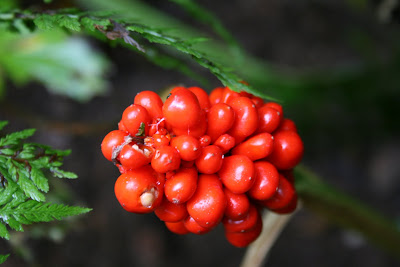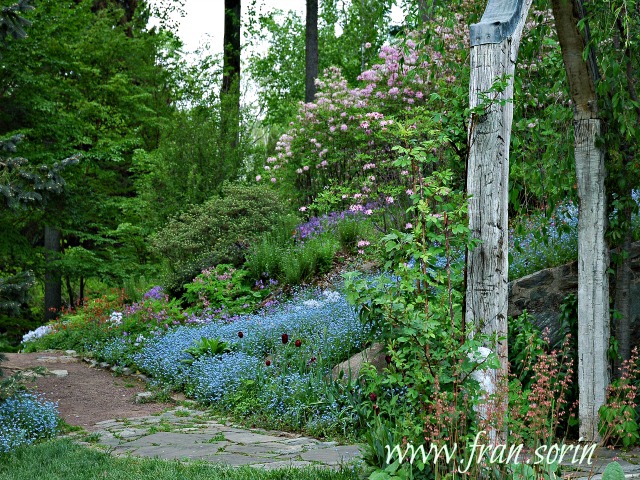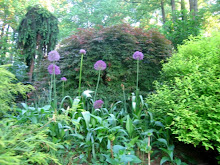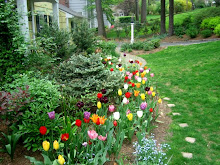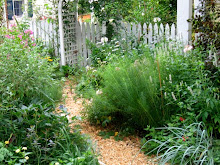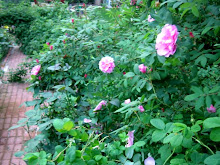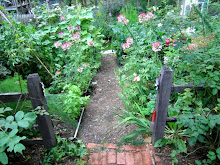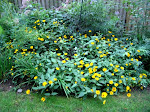After Chrstopher Lloyd died in 2006, "many at that point wondered what would happen to his celebrated garden, Great Dixter." There is a fascinating story here by Tim Richardson about how Fergus Garrett maintain's "Great Dixter's spirit of originality."
What's the secret? "The key to the garden's originality and verve is partly due to the working method laid down by Christo. This consisted of a daily perambulation around the garden which lasted about an hour, during which time Christo and Fergus would make perhaps 60 decisions, small and large. About half of them were to be dealt with immediately, the rest stored up for the right seasonal moment. 'Everything was looked at and carefully considered,' Fergus says. 'We asked: is it worth it? Does it grow well? Does it stand on its own?'"
Welcome to Heirloom Gardener
Tuesday, December 29, 2009
Telegraph.co.uk: Great Dixter after Christopher Lloyd
Posted by
Julia Erickson
at
7:04 AM
2
comments
![]()
![]()
Labels: Botanical Gardens
Sunday, December 27, 2009
Telegraph.co.uk: Garden of the Year photography competition
I love English gardens. Check out the stunning photos of these fabulous English gardens here, including: Burton Agnes Hall, Ilford Manor, Borde Hill Gardens, Houghton Hall, Mellerstain House, Athelhampton, Arley Hall, Exbury Gardens, Kiftsgate Court and Parham Park.
Posted by
Julia Erickson
at
6:48 AM
3
comments
![]()
![]()
Labels: Botanical Gardens
Friday, December 04, 2009
End of Season Roses: Fairy near the back steps
Posted by
Julia Erickson
at
6:00 AM
3
comments
![]()
![]()
Labels: Roses
Wednesday, December 02, 2009
End of Season Roses: Star of the Republic in the Triangle Garden
Posted by
Julia Erickson
at
6:00 AM
3
comments
![]()
![]()
Labels: Roses
Monday, November 30, 2009
End of Season Clematis: Arabella in the Cutting Garden
Posted by
Julia Erickson
at
6:00 AM
8
comments
![]()
![]()
Labels: Clematis
Friday, November 27, 2009
End of Season Clematis: Marie Boisselot on the Arbor to the Cutting Garden
Posted by
Julia Erickson
at
6:00 AM
12
comments
![]()
![]()
Labels: Clematis
Wednesday, November 25, 2009
End of Season Roses: Gruss an Aachen in the Children's Garden
Posted by
Julia Erickson
at
6:00 AM
3
comments
![]()
![]()
Labels: Roses
Monday, November 23, 2009
End of Season Roses: Rose de Rescht in the Egg Garden
Posted by
Julia Erickson
at
6:00 AM
6
comments
![]()
![]()
Labels: Roses
Sunday, November 22, 2009
Picture This Photo Contest: the End of the Line
Click here for the previous Gravetye Beauty Clematis Seed Head post that I used for my entry for this month's contest at Gardening Gone Wild: the End of the Line. The deadline is midnight tonight.
Posted by
Julia Erickson
at
9:21 PM
1 comments
![]()
![]()
Labels: Picture This Photo Contest
Friday, November 20, 2009
End of Season Roses: Nur Mahal Hybrid Musk Rose Bred by Bishop Pemberton Next to the Lamp Post
Posted by
Julia Erickson
at
6:00 AM
7
comments
![]()
![]()
Labels: Roses
Wednesday, November 18, 2009
The Last Dahlia of the Season

Posted by
Julia Erickson
at
6:00 AM
1 comments
![]()
![]()
Labels: Dahlias
Monday, November 16, 2009
NJ Farmers' Market Update: Sundays in Summit extended to Christmas
Good news! The Sunday Farmers' Markets in Summit, New Jersey have been extended until the weekend before Christmas. I remember from last year that the number of shoppers dropped off significantly with the cold weather, so they didn't know if they were going to try to do it again this year. Alas, here's your opportunity to dress warmly and continue supporting the farmers. If enough people come out, maybe we can have a year-round farmers' market like they in other areas.
Posted by
Julia Erickson
at
6:00 AM
2
comments
![]()
![]()
Labels: Heirloom and Organic Food, New Jersey / Local Interest
Friday, November 13, 2009
Fall Colors: an Arrangement of Mophead Hydrangeas
Posted by
Julia Erickson
at
6:00 AM
4
comments
![]()
![]()
Labels: Cut and Forced Flowers, Hydrangeas
Wednesday, November 11, 2009
After the Frost: Time to Start Digging up the Dahlia Tubers

Posted by
Julia Erickson
at
6:00 AM
5
comments
![]()
![]()
Labels: Bulbs and Tubers, Dahlias, Pruning and Maintenance
Monday, November 09, 2009
Blotanical's Best Pennsylvania Gardening Blogs of 2009
I live in New Jersey, but feel a special kinship with my gardening friends in Pennsylvania. It, of course, is the home of one of my favorite public gardens, Chanticleer, and so many other lovely gardens and gardeners. Here are Blotanical's Best Pennsylvania Gardening Blogs for 2009:
.
1. Hayefield - one of my favorite blogs that I was happy to see ranked first. It is garden writer Nan Ondra's personal blog: "I live in Bucks County, Pennsylvania, about 40 miles north of Philadelphia (mid-Zone 6 to lower Zone 7, depending on whose map you use). Under the supervision of my two alpacas, Duncan and Daniel, I garden on four acres in full sun: about two acres of managed meadow, one acre of pasture, and one acre of intensively planted and open shrubbery areas. This garden is entering its eighth year in 2009."
.
2. Poor Richard's Almanac - this was a new discovery for me. "Author, editor, homesteader, collector–our friend Ben is all that and (of course) much more. When asked by the moderator at one of those corporate seminars what I’d be if I could be anything at all, the answer popped into my mind like Athena bursting full grown from the forehead of Zeus: I’d like to be the head of my own think tank. That’s because I love to think, about all sorts of things, all the time..."
.
3. Burbs and the Bees - this is another new one for me and one I look forward to reading more. "Adventures of suburban homesteading and novice beekeeping. Trying to jam as much farm life as I can into our little piece of suburban woodland! Thanks for stopping by to share in our adventures of suburban homesteading, gardening, and novice beekeeping!"
.
4. Veggie Gardening Tips - as a novice vegetable gardener, I have found this blog to be full of wonderful organic vegetable gardening ideas. "...In 1985, a few years after graduating from college, I resigned from a great job with the Federal Reserve Board in Washington D.C. and moved to Pennsylvania to accept an internship on a forty acre organic farm...At the time, many of my friends and family thought it was a crazy idea, but it turned out to be the best decision I ever made. During a few short years on the farm I learned an incredible amount about gardening, nature, and self sufficiency."
.
5. My Little Patch of Green - this is another new one to me. "My name is Dawn and I have been an on-again-off-again gardener in my yard in Northeast Pennsylvania. I love the idea of gardening. I love looking at pictures of gardens. But while I have big dreams for my garden, I always seem to fail in the execution. I have sadly neglected my garden for the last few years, but this year will be a new beginning. It won’t be an extreme makeover, but a slow transformation."
Posted by
Julia Erickson
at
8:00 AM
5
comments
![]()
![]()
Labels: Gardening Blogs
Friday, November 06, 2009
Fall Colors: Pee Gee Hydrangea in the Front Border

Posted by
Julia Erickson
at
6:00 AM
7
comments
![]()
![]()
Labels: Hydrangeas
Wednesday, November 04, 2009
Adam Woodruff's visit to Oudolf Nursery & Garden - Hummelo, The Netherlands
Check out this great post (with pictures) of Adam Woodruff's visit to the Oudolf Nursery & Garden over at Gardening Gone Wild:
"On a personal note, I introduced myself to Piet after I had toured the property. He was incredibly open and generous with his time: going so far as to step away from his guests and give me a tour of his studio, where he graciously entertained all my questions, shared some of his current projects and recommended a few other gardens to visit."
Posted by
Julia Erickson
at
9:43 PM
3
comments
![]()
![]()
Labels: Botanical Gardens, Piet Oudolf
Fall Colors: Chrysathemum in the Front Border
Posted by
Julia Erickson
at
6:00 AM
4
comments
![]()
![]()
Labels: Chrysanthemum
Monday, November 02, 2009
End of Season Roses: Danae in the Cutting Garden
Posted by
Julia Erickson
at
6:00 AM
1 comments
![]()
![]()
Labels: Roses
Sunday, November 01, 2009
Poemas del río Wang: Imperial crown
 I grow and love Crown Imperial Fritillaria in the Rose Garden, but I've never seen such an amazing display as this--an entire mountainside in Iran: Poemas del río Wang: Imperial crown.
I grow and love Crown Imperial Fritillaria in the Rose Garden, but I've never seen such an amazing display as this--an entire mountainside in Iran: Poemas del río Wang: Imperial crown.
Posted by
Julia Erickson
at
7:52 PM
6
comments
![]()
![]()
Labels: Bulbs and Tubers, Gardening Blogs
British Rose Garden Tour - Summer 2010
This is a tour I would love. From Clair Martin at Great Rosarians Blog: "I signed the contract for the Summer of British Rose Gardens tour for next year. The tour meets up in London on Tuesday, June 15 and we end on June 25, 2010." Montisfont Abbey Gardens, David Austin Rose Garden, and more!
.
Clair Martin is the first Shannon Curator of the Rose Garden at The Huntington Library, Art Collections, and Botanical Gardens located in San Marino, California a position he has held since 1983.
Posted by
Julia Erickson
at
12:00 AM
1 comments
![]()
![]()
Labels: Botanical Gardens, Roses
Friday, October 30, 2009
End of Season Roses: Roulette in the Egg Garden
Posted by
Julia Erickson
at
6:00 AM
2
comments
![]()
![]()
Labels: Roses
Wednesday, October 28, 2009
End of Season Roses: Heritage David Austin Rose in the Children's Garden
Posted by
Julia Erickson
at
9:43 PM
3
comments
![]()
![]()
Labels: Roses
Tuesday, October 27, 2009
Redback (?) Salamander (Plethedon or Plethodon cinereus)
Using The Field Guide to Reptiles and Amphibians of New Jersey from the NEW JERSEY DEPARTMENT OF ENVIRONMENTAL PROTECTION, I tried to identify this little fellow we found among some of the garden clippings. He looked reddish brown with very small white spots all over his body. The belly was the same color. As you can see in the picture, he didn't want to sit still for a photograph, so we quickly snapped these pictures and then let him go into the Egg Garden. Interestingly, it also looked like he may have recently lost his tail. If someone more knowledgeable can verify or correct the identification, leave a comment.
Posted by
Julia Erickson
at
9:30 PM
5
comments
![]()
![]()
Labels: Wildlife in the Garden
Monday, October 26, 2009
End of Season Roses: Delicata on Goldberry Hill
Posted by
Julia Erickson
at
10:31 AM
6
comments
![]()
![]()
Labels: Roses
Friday, October 23, 2009
Photo Contest: Abundant Harvest
I just squeezed in my entry at the last minute for this month's Picture This Photo Contest at Gardening Gone Wild. The subject is Abundant Harvest and you can see my entry here.
Posted by
Julia Erickson
at
9:55 PM
0
comments
![]()
![]()
Labels: Picture This Photo Contest
End of Season Roses: Cecil Brunner on Goldberry Hill
Posted by
Julia Erickson
at
10:29 AM
2
comments
![]()
![]()
Labels: Roses
Thursday, October 22, 2009
Locally Raised Organic Turkeys for Thanksgiving
Do you like to eat fresh, organic meats? Do you serve Turkey for Thanksgiving? Do you like supporting local farms? If yes and you live in northern New Jersey, I highly recommend pre-ordering your Turkey for Thanksgiving from Vacchiano Farms. They just started taking orders last Sunday at the Summit Farmers' Market. We tried their turkey last year and it was the best we ever had.
Posted by
Julia Erickson
at
11:44 PM
2
comments
![]()
![]()
Labels: New Jersey / Local Interest
Wednesday, October 21, 2009
Coping with Slopes - Gardening Gone Wild's Garden Bloggers' Design Workshop

.
When we were house hunting back in 2001, I was only a beginning gardener. I had dabbled with gardening in Brooklyn, but wasn't so serious that how I would garden on this property's slope wasn't even a consideration. Once I got more serious about gardening, I wished for a flat property, but worked with what I had.
.
Here are a few prior posts about my experiences:
.
1. Five Ideas for the Downward Sloping Front Yard
2. Creating the Egg Garden on my Front Slope
3. Goldberry Hill Last Summer (pictured above)
4. Goldberry Hill Last Spring
5. How to Build Raised (Vegetable) Beds on a Slope
6. How to Build a Children's Playhouse (Fort) on a Slope
.
For a map of how the gardens are situated on the property, click here. If I have more time, I'll write some additional posts about a few more of the sloped areas: Lilac Hill and the new stone staircase to the backyard.
Posted by
Julia Erickson
at
10:00 PM
3
comments
![]()
![]()
Labels: Garden Bloggers' Design Workshop
End of Season Roses: Ballerina on Goldberry Hill
Posted by
Julia Erickson
at
10:28 AM
2
comments
![]()
![]()
Labels: Roses
Monday, October 19, 2009
End of Season Roses: Dortmund on the Arbor
Posted by
Julia Erickson
at
6:00 AM
3
comments
![]()
![]()
Labels: Roses
Sunday, October 18, 2009
WSJ: Canning Makes A Combeack
Our vegetable garden isn't big enough to produces excess for canning, but the children do love making pickles from the cucumbers at the farmers' market. From Ana Campoy's article in The Wall Street Journal:
"The worst recession in decades and a trend toward healthier eating are inspiring many Americans to grow their own food. Now the harvest season is turning many of these gardeners into canners looking to stretch the bounty of the garden into the winter...
At Jarden Corp.'s Jarden Home Brands—the maker of Kerr and Ball brand jars—sales of canning equipment are up 30% this year through mid-September, over the same period in 2008. And canning classes from Brooklyn, N.Y., to Boise, Idaho, report seeing skyrocketing enrollments this year.
Canning has been around since the dawn of the 19th century, when, at Napoleon's behest, a Frenchman developed a method of sealing food in bottles to prevent spoilage on long military campaigns. The process was later adapted to factory-sealed metal cans, but at home, "canning" is still practiced in thick glass jars..."
Posted by
Julia Erickson
at
10:43 AM
2
comments
![]()
![]()
Labels: Heirloom and Organic Food
Saturday, October 17, 2009
Thursday, October 15, 2009
Clematis Seed Head on the Arbor in the Cutting Garden
Posted by
Julia Erickson
at
6:14 AM
4
comments
![]()
![]()
Labels: Clematis
Tuesday, October 13, 2009
Clematis Seed Head on the Arbor in the Cutting Garden
Posted by
Julia Erickson
at
6:16 AM
2
comments
![]()
![]()
Labels: Clematis
Sunday, October 11, 2009
Gravetye Beauty Clematis Seed Head on Goldberry Hill
Posted by
Julia Erickson
at
6:12 AM
5
comments
![]()
![]()
Labels: Clematis
Friday, October 09, 2009
Clematis Seed Head in the Children's Garden
Posted by
Julia Erickson
at
6:10 AM
2
comments
![]()
![]()
Labels: Clematis
Wednesday, October 07, 2009
Bee Balm Seed Heads in the Egg Garden
Posted by
Julia Erickson
at
6:00 AM
4
comments
![]()
![]()
Labels: Annuals/Biennials and Perennials
Monday, October 05, 2009
Orange Calendula in the Front Border
Posted by
Julia Erickson
at
7:44 PM
0
comments
![]()
![]()
Labels: Annuals/Biennials and Perennials
Sunday, October 04, 2009
Purple Colchicum in the Front Border
Posted by
Julia Erickson
at
7:42 PM
3
comments
![]()
![]()
Labels: Bulbs and Tubers
Saturday, October 03, 2009
Friday, October 02, 2009
Jack in the Pulpit, Arisaema triphyllum, Seed Head in the Walled Garden
Posted by
Julia Erickson
at
6:00 PM
0
comments
![]()
![]()
Labels: Annuals/Biennials and Perennials
Thursday, October 01, 2009
Harvard Yard is making the move to organic lawn care
Good news from Cambridge, Massachusetts: Ann Raver in The New York Times reports that Harvard is following in Heirloom Gardener's footsteps (just kidding) and moving to organic lawn care. One part of the article that I found particularly interesting was the positive impact on the trees. Read the full article here.
"THERE is an underground revolution spreading across Harvard University this fall. It’s occurring under the soil and involves fungi, bacteria, microbes and roots, which are now fed with compost and compost tea rather than pesticides and synthetic nitrogen. The results have so astounded university administrators that what started as a one-acre pilot project in Harvard Yard has spread organic practices through 25 acres on the campus...The organically grown grass on campus is now green from the microbes that feed the soil, eliminating the use of synthetic nitrogen, the base of most commercial fertilizers. No herbicides or pesticides are used, either. Roots reach eight inches into soil that was once so compacted the trees planted in it were dying."
Posted by
Julia Erickson
at
10:00 PM
4
comments
![]()
![]()
Labels: Fun Stories About Gardening
Celine Forestier (1842), Noisette Rose, on the Arbor to the Children's Garden
Posted by
Julia Erickson
at
6:02 PM
1 comments
![]()
![]()
Labels: Roses
Wednesday, September 30, 2009
Blotanical's Best Gardening Blogs for New Jersey 2009
Thank you so much for everyone (all 104 of you) who voted for Heirloom Gardener! Here are the rest of Blotanical's Best Gardening Blogs for New Jersey 2009:
2. Best in Bloom Today - a new discovery for me, "Married to Hubba Hubba, proud mom of 2 Darling Daughters, passionate gardener (is there any other kind?), especially daylilies! Addicted to nursery hopping...name any garden center in NJ/PA...I've been there...honest!"
3. View from Federal Twist - a favorite of mine for some time, "We moved to Rosemont in June 1999. Originally known as Cross Keys Tavern in the mid-18th century, Rosemont has remained an agricultural community for over two centuries..."
4. Miss Rumphius' Rules - a new discovery for me, "My blog was conceived in 2007 as an online journal exploring my continuing journey as a designer with a focus on design, gardens, and the creative process."
5. Garden Endeavors - a new discovery for me, "Gardening by the shore in southern New Jersey.My husband and I both enjoy the garden, all the vegetables are grow by him and everything else by me..."
I'm honored to be among the many 2009 award winners. Check out all of the winners here.
Posted by
Julia Erickson
at
11:01 PM
7
comments
![]()
![]()
Labels: Gardening Blogs
Tuesday, September 29, 2009
Frau Dagmar Hastrup (1914), Rugosa Rose, on Goldberry Hill
Posted by
Julia Erickson
at
7:30 PM
5
comments
![]()
![]()
Labels: Roses
Monday, September 28, 2009
Monarch Butterfly (Danaus plexippus) on the Butterfly Bush
Posted by
Julia Erickson
at
5:47 AM
2
comments
![]()
![]()
Labels: Wildlife in the Garden
Sunday, September 27, 2009
2009 Blotanical Awards - voting ends in two days
Just browse some great blogs or vote here.
Posted by
Julia Erickson
at
7:46 PM
0
comments
![]()
![]()
Labels: Gardening Blogs
Saturday, September 26, 2009
Friday, September 25, 2009
Thursday, September 24, 2009
Wednesday, September 23, 2009
Monday, September 21, 2009
Saturday, September 19, 2009
Sweet Autumn Clematis in the Bird Garden
Posted by
Julia Erickson
at
6:00 PM
2
comments
![]()
![]()
Labels: Clematis
Friday, September 18, 2009
"In 1999, the Atlantic Monthly estimated that Borlaug's efforts...saved the lives of one billion human beings."
As readers of this blog know, I am a big fan of heirloom and organic gardening and food production, but know that in practice (my backyard), the yields are much lower. Thus, heirloom and organic food is a luxury that many in this country cannot afford and in most countries is non-existent. In that context, I found this obituary interesting, particularly the difference in agricultural development in Asia, where famine has been eliminated, and Africa, where famine continues to persist.
.
From Gregg Easterbrook's obituary on Norman Borlaug in The Wall Street Journal. For the full article click here.
'As a young agronomist, Borlaug helped develop some of the principles of Green Revolution agriculture on which the world now relies including hybrid crops selectively bred for vigor, and "shuttle breeding," a technique for accelerating the movement of disease immunity between strains of crops. He also helped develop cereals that were insensitive to the number of hours of light in a day, and could therefore be grown in many climates.
.
Green Revolution techniques caused both reliable harvests, and spectacular output. From the Civil War through the Dust Bowl, the typical American farm produced about 24 bushels of corn per acre; by 2006, the figure was about 155 bushels per acre.
.
Hoping to spread high-yield agriculture to the world's poor, in 1943 Borlaug moved to rural Mexico to establish an agricultural research station, funded by the Rockefeller Foundation. Borlaug's little research station became the International Maize and Wheat Center, known by its Spanish abbreviation CIMMYT, that is now one of the globe's most important agricultural study facilities. At CIMMYT, Borlaug developed the high-yield, low-pesticide "dwarf" wheat upon which a substantial portion of the world's population now depends for sustenance.
.
In 1950, as Borlaug began his work in earnest, the world produced 692 million tons of grain for 2.2 billion people. By 1992, with Borlaug's concepts common, production was 1.9 billion tons of grain for 5.6 billion men and women: 2.8 times the food for 2.2 times the people. Global grain yields more than doubled during the period, from half a ton per acre to 1.1 tons; yields of rice and other foodstuffs improved similarly. Hunger declined in sync: From 1965 to 2005, global per capita food consumption rose to 2,798 calories daily from 2,063, with most of the increase in developing nations. In 2006, the United Nations Food and Agriculture Organization declared that malnutrition stands "at the lowest level in human history," despite the global population having trebled in a single century.
.
In the mid-1960s, India and Pakistan were exceptions to the trend toward more efficient food production; subsistence cultivation of rice remained the rule, and famine struck. In 1965, Borlaug arranged for a convoy of 35 trucks to carry high-yield seeds from CIMMYT to a Los Angeles dock for shipment to India and Pakistan. He and a coterie of Mexican assistants accompanied the seeds. They arrived to discover that war had broken out between the two nations. Sometimes working within sight of artillery flashes, Borlaug and his assistants sowed the Subcontinent's first crop of high-yield grain. Paul Ehrlich gained celebrity for his 1968 book "The Population Bomb," in which he claimed that global starvation was inevitable for the 1970s and it was "a fantasy" that India would "ever" feed itself. Instead, within three years of Borlaug's arrival, Pakistan was self-sufficient in wheat production; within six years, India was self-sufficient in the production of all cereals.
.
After his triumph in India and Pakistan and his Nobel Peace Prize, Borlaug turned to raising crop yields in other poor nations especially in Africa, the one place in the world where population is rising faster than farm production and the last outpost of subsistence agriculture. At that point, Borlaug became the target of critics who denounced him because Green Revolution farming requires some pesticide and lots of fertilizer. Trendy environmentalism was catching on, and affluent environmentalists began to say it was "inappropriate" for Africans to have tractors or use modern farming techniques. Borlaug told me a decade ago that most Western environmentalists "have never experienced the physical sensation of hunger. They do their lobbying from comfortable office suites in Washington or Brussels. If they lived just one month amid the misery of the developing world, as I have for 50 years, they'd be crying out for tractors and fertilizer and irrigation canals and be outraged that fashionable elitists in wealthy nations were trying to deny them these things."'
Posted by
Julia Erickson
at
4:07 PM
3
comments
![]()
![]()
Labels: Deep Thoughts About Gardening
Thursday, September 17, 2009
Parsley Blooms in the Bird Garden
Posted by
Julia Erickson
at
6:00 PM
6
comments
![]()
![]()
Labels: Heirloom and Organic Food
Search Heirloom Gardener
Labels
- About Blogging
- Annuals/Biennials and Perennials
- Autumn Garden
- Books and Movies
- Botanical Gardens
- Bulbs and Tubers
- Children's Garden
- Chrysanthemum
- Clematis
- Container Gardening
- Crocus tommasiniasus roseus
- Cut and Forced Flowers
- Cutting and Rose Gardens
- Dahlias
- Deep Thoughts About Gardening
- Egg Garden
- Fences Arbors Walls and Paths
- Floral arrangements
- Front Border
- Fun Stories About Gardening
- Garden Bloggers' Bloom Day
- Garden Bloggers' Design Workshop
- Garden Planning
- Gardening Blogs
- Gardening Tools and Structures
- Gardening with Children
- Goldberry Hill
- Heirloom and Organic Food
- Hibiscus
- Holidays
- Hydrangeas
- Japanese Beautyberry
- Lilies
- Mixed Borders
- New Jersey / Local Interest
- Nurseries
- Online Gardening Resources
- Peonies
- Pest Control
- Picture This Photo Contest
- Piet Oudolf
- Poppies
- Propagation and Seeds
- Pruning and Maintenance
- Roses
- Seed Heads
- Self Seeders
- Shrubs
- Spring Garden
- Summer Garden
- Trees
- Wildlife in the Garden
- Winter Garden
- Zinia
Blog Archive
-
▼
2009
(257)
-
►
November
(17)
- End of Season Clematis: Arabella in the Cutting G...
- End of Season Clematis: Marie Boisselot on the Ar...
- End of Season Roses: Gruss an Aachen in the Child...
- End of Season Roses: Rose de Rescht in the Egg Ga...
- Picture This Photo Contest: the End of the Line
- End of Season Roses: Nur Mahal Hybrid Musk Rose B...
- The Last Dahlia of the Season
- NJ Farmers' Market Update: Sundays in Summit exte...
- Fall Colors: an Arrangement of Mophead Hydrangeas
- After the Frost: Time to Start Digging up the Dah...
- Blotanical's Best Pennsylvania Gardening Blogs of ...
- Fall Colors: Pee Gee Hydrangea in the Front Border
- Adam Woodruff's visit to Oudolf Nursery & Garden -...
- Fall Colors: Chrysathemum in the Front Border
- End of Season Roses: Danae in the Cutting Garden
- Poemas del río Wang: Imperial crown
- British Rose Garden Tour - Summer 2010
-
►
October
(23)
- End of Season Roses: Roulette in the Egg Garden
- End of Season Roses: Heritage David Austin Rose i...
- Redback (?) Salamander (Plethedon or Plethodon cin...
- End of Season Roses: Delicata on Goldberry Hill
- Photo Contest: Abundant Harvest
- End of Season Roses: Cecil Brunner on Goldberry Hill
- Locally Raised Organic Turkeys for Thanksgiving
- Coping with Slopes - Gardening Gone Wild's Garden ...
- End of Season Roses: Ballerina on Goldberry Hill
- End of Season Roses: Dortmund on the Arbor
- WSJ: Canning Makes A Combeack
- Teasel Seed Head on Lilac Hill
- Clematis Seed Head on the Arbor in the Cutting Garden
- Clematis Seed Head on the Arbor in the Cutting Garden
- Gravetye Beauty Clematis Seed Head on Goldberry Hill
- Clematis Seed Head in the Children's Garden
- Bee Balm Seed Heads in the Egg Garden
- Orange Calendula in the Front Border
- Purple Colchicum in the Front Border
- Rosa Rubrifolia Hips on Goldberry Hill
- Jack in the Pulpit, Arisaema triphyllum, Seed Head...
- Harvard Yard is making the move to organic lawn care
- Celine Forestier (1842), Noisette Rose, on the Arb...
-
►
September
(28)
- Blotanical's Best Gardening Blogs for New Jersey 2009
- Bonica, Shrub Rose, on Goldberry Hill
- Frau Dagmar Hastrup (1914), Rugosa Rose, on Goldbe...
- Monarch Butterfly (Danaus plexippus) on the Butter...
- 2009 Blotanical Awards - voting ends in two days
- Dahlia in the Cutting Garden
- Purple Angelica Seed Heads
- Red Zinia in the Cutting Garden
- Dark Pink Zinia in the Cutting Garden
- Light Pink Zinia in the Cutting Garden
- White Zinia in the Cutting Garden
- Sweet Autumn Clematis in the Bird Garden
- "In 1999, the Atlantic Monthly estimated that Borl...
- Parsley Blooms in the Bird Garden
-
►
November
(17)
































